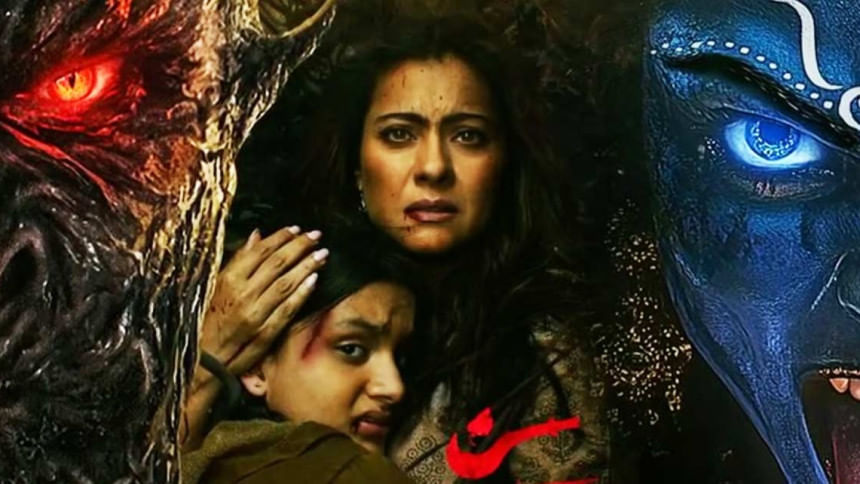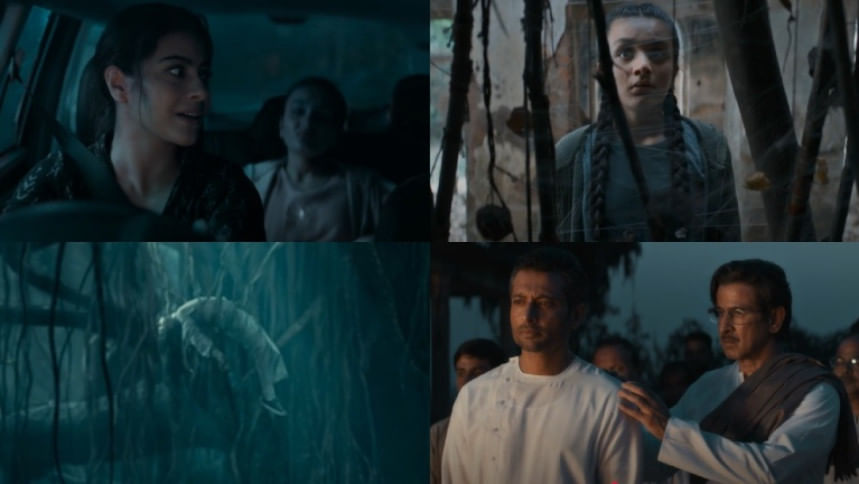The weight of myth and maternal fury in ‘Maa’

Every few years, Bollywood offers a story of maternal heroism, where a mother becomes both protector and saviour, taking centre stage in a narrative traditionally dominated by male leads. "Maa" enters this lineage with Kajol in the titular role, a choice that immediately draws attention. The film, currently streaming on Netflix, blends horror with mythology to weave a narrative that pits a mother's fierce love against supernatural forces rooted in Bengali folklore. Set in Chandrapur, West Bengal, the story is anchored in the legend of Raktabeej and the fierce presence of Kali Maa, aiming to merge ancient myth with contemporary familial stakes. On paper, the premise is ambitious: a mother willing to defy mortal and supernatural odds to protect her child, all while exploring broader social themes, particularly the value of a girl child in a patriarchal setting.
The opening sequences establish the stakes immediately with a ritualistic ceremony, the sacrifice of a newborn girl, and the shadow of a demon. There is an intensity to these scenes, a sense that something dark and consequential is unfolding. The film then leaps 40 years ahead, introducing us to Ambika, Shubhankar, and their daughter Shweta, leading an ostensibly normal life in Kolkata. This temporal jump is intended to juxtapose the tranquillity of family life with the lurking dread of Chandrapur, a village whose cursed legacy now calls them back. The narrative sets up expectations for suspense, terror, and emotional intensity. Yet, as the story progresses, the tension that the premise suggests rarely sustains itself.
Kajol, at the heart of the film, delivers a committed performance, but one constrained by writing that fails to allow her character to evolve convincingly. Ambika is meant to transition from an ordinary mother to an awe-inspiring figure capable of confronting the mythological and the monstrous. Instead, the transformation feels underdeveloped. In crucial moments of fear, grief, or anger, the depth of maternal desperation is often flattened, leaving viewers aware of the stakes but not fully invested emotionally. Indraneil Sengupta as Shubhankar largely operates in the background; his presence is for narrative function, lacking a distinct impact. Kherin Sharma's portrayal of Shweta is uneven; while she shows glimpses of innocence and vulnerability, the character lacks the authenticity necessary to anchor the mother-daughter dynamic fully, and their emotional bond on screen remains insufficiently realised.

The supporting cast, including Ronit Roy as the village headman, brings flashes of engagement. Roy's performance is nuanced in contrast to some of the caricatured portrayals around him, and he provides a tether to the folklore that the film otherwise struggles to render convincingly. Other secondary characters oscillate between effective atmospheric contributions and overstated theatrics, resulting in an uneven ensemble. The film's portrayal of Bengali culture is inconsistent, with attempts at accent and local colour feeling occasionally forced, which undermines the authenticity that mythologically-rooted horror relies upon. Visually, "Maa" makes some attempts to create an immersive horror environment. Certain set pieces and camera movements hint at suspenseful and eerie possibilities, and the forest and ancestral home settings are atmospheric when used judiciously.
Yet, the visual design is uneven, and the CGI employed for the demon and supernatural elements frequently diminishes rather than heightens the fear factor. The demon, Aamsaja, receives significant screentime, but the logic and menace of the creature are unfulfilled, leaving it closer to a mid-budget television effect than the terror one might anticipate from a mythologically empowered antagonist. Lighting choices, standard within Bollywood horror tropes, further flatten the tension, often signalling scares rather than creating a palpable sense of dread. The screenplay is perhaps the film's most significant obstacle. The story shifts between various horror and mythological tropes without establishing a coherent rhythm. Plot points that should generate suspense instead feel predictable, and moments of supernatural confrontation often follow a formulaic pattern rather than organically building tension. There are inconsistencies in character decision-making, most notably Ambika's insistence on visiting Chandrapur despite knowing the dangers. This narrative dissonance weakens the stakes and diminishes the urgency, leaving the audience disengaged from events that should feel life-or-death.
Despite these limitations, the film is not devoid of merit. Its ambition to explore maternal heroism in the context of folklore, gender norms, and societal pressures is unmistakable. The subtextual commentary on the value of girls in a patriarchal society, combined with horror as a vehicle to explore these themes, is a conceptually strong foundation. In the climax, where Ambika confronts the demon and fully embraces her role as protector, the narrative momentarily achieves its intended resonance. Kajol's portrayal here is at its most compelling, demonstrating both her screen presence and the potential of the character when afforded sufficient narrative space. The integration of mythology into the horror framework is uneven but contains glimpses of originality. The references to Kali Maa, Raktabeej, and ritualistic practices provide a cultural texture that differentiates the film from standard horror fare, though the execution falls short of fully realising this richness. There are moments where the mythology feels incidental rather than integral, as though the story borrows its motifs rather than embedding them in a lived, coherent world. Similarly, the feminist undertones and social commentary, while conceptually interesting, are underdeveloped, leaving their impact diluted.

Structurally, the film benefits from a relatively concise runtime, which prevents meandering. The pacing in the first half establishes character and setting with enough efficiency, and the interval appears at a logical moment. However, the second half struggles with tension escalation and climactic payoff. Action sequences, particularly those involving supernatural confrontations, occasionally achieve visual flair, but their narrative justification is weak, and they lack the emotional weight to make the audience invested. The film's ambition to combine horror, myth, and maternal drama results in a product that is more patchwork than holistic, intermittently engaging but rarely consistent.
Overall, "Maa" is a film of contrasts: it is at once ambitious and uneven, visually evocative yet narratively flawed, emotionally rooted yet underwritten. Kajol's performance is the film's anchor, providing sincerity and energy that the writing and direction cannot consistently match. The film's exploration of maternal heroism in a mythologically charged environment is a worthy endeavour, and there are moments where the story and performances align to produce genuine engagement. However, these instances are sporadic, and the broader execution prevents the film from fully achieving its potential. For audiences seeking a blend of horror, folklore, and maternal drama, this film offers glimpses of interest and some engagement. For those hoping for a fully realised mythological horror, it is likely to feel frustrating, with predictable beats, uneven performances, and visual effects that fall short of expectation. The film suggests a first step towards the formation of a cinematic universe and leaves hints of possible expansion, but it is a tentative step rather than a confident leap. "Maa" is worth watching for Kajol and the moments of mythology-infused tension, but the experience will leave viewers reflecting more on what the film could have been than on what it is.

 For all latest news, follow The Daily Star's Google News channel.
For all latest news, follow The Daily Star's Google News channel. 









Comments